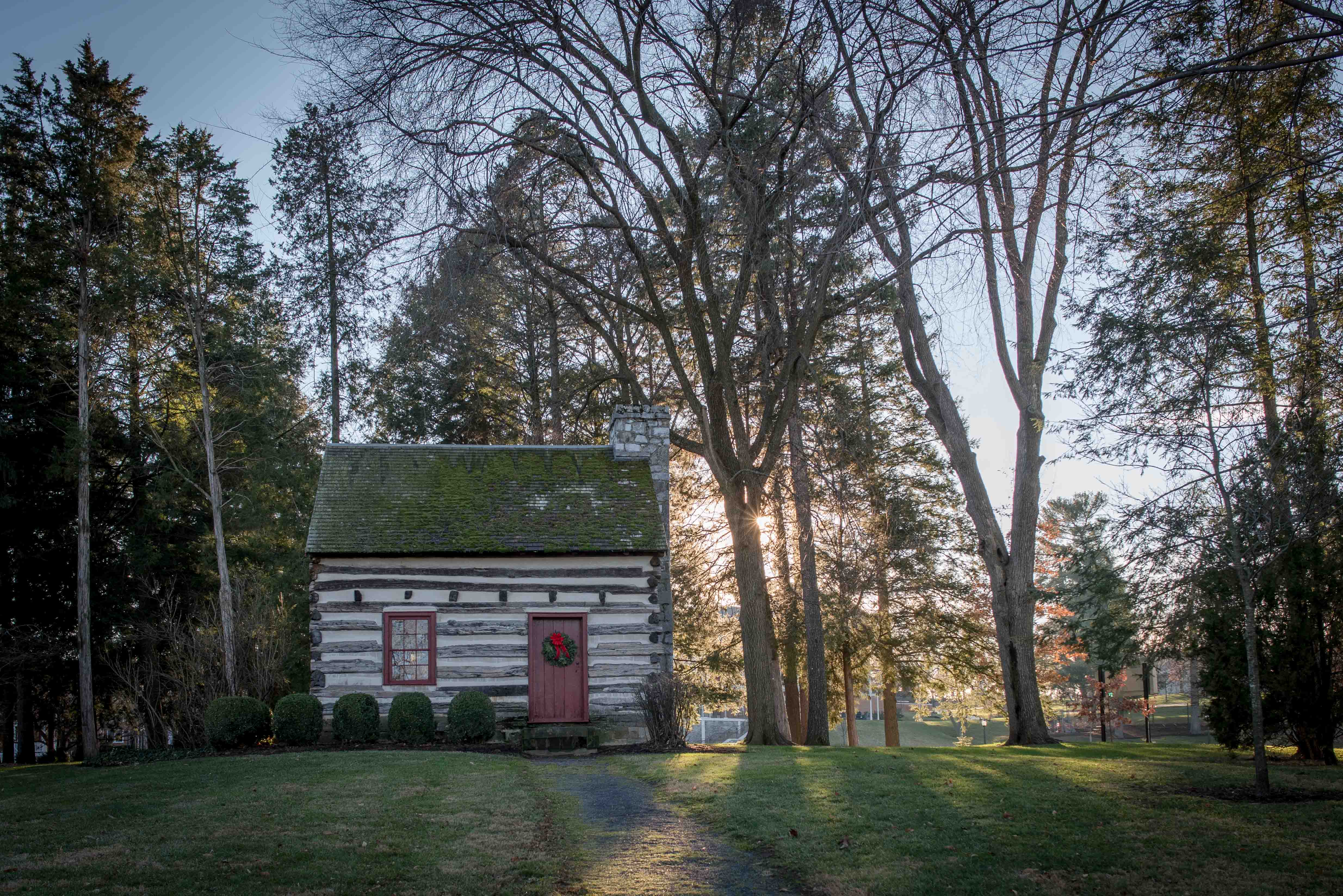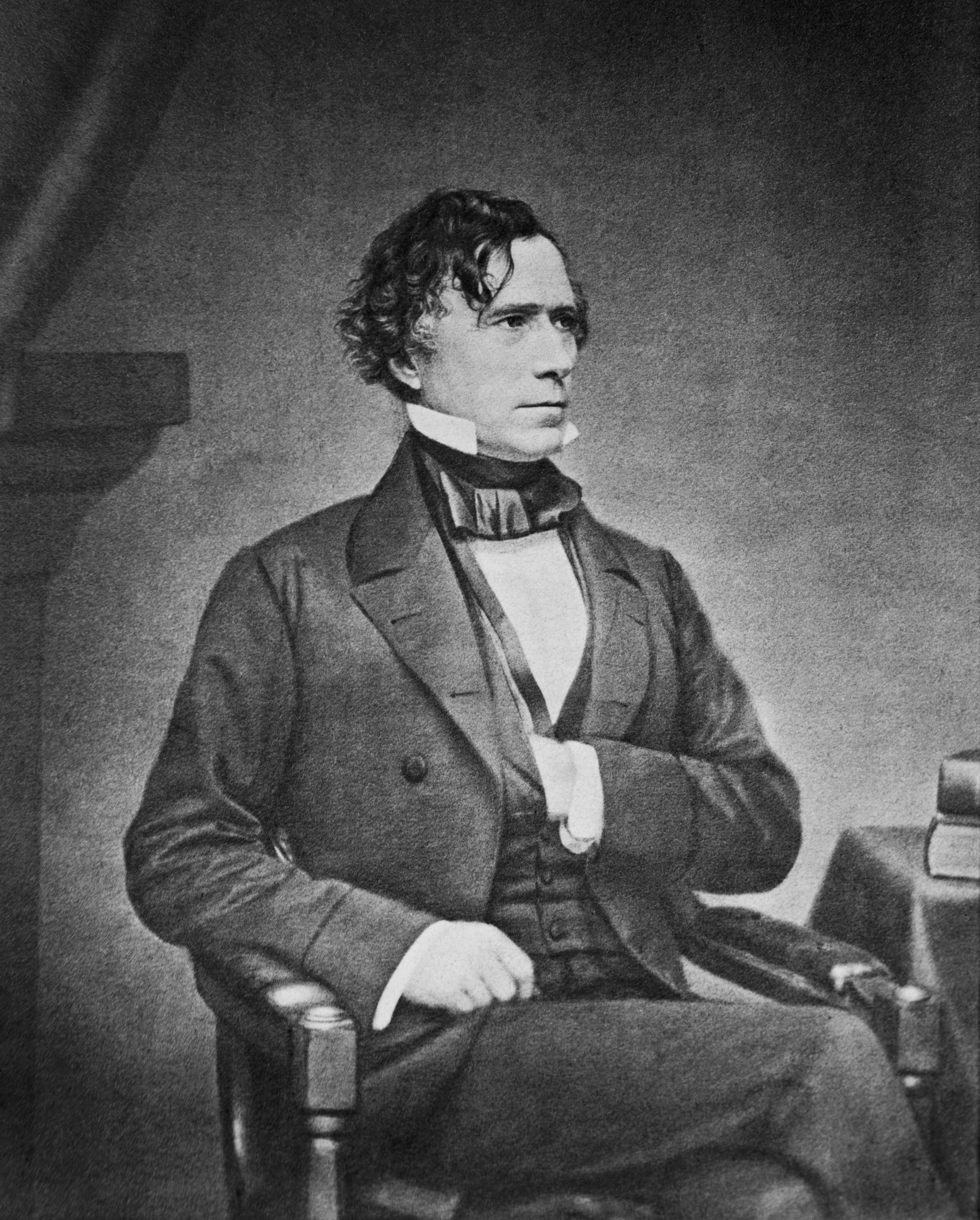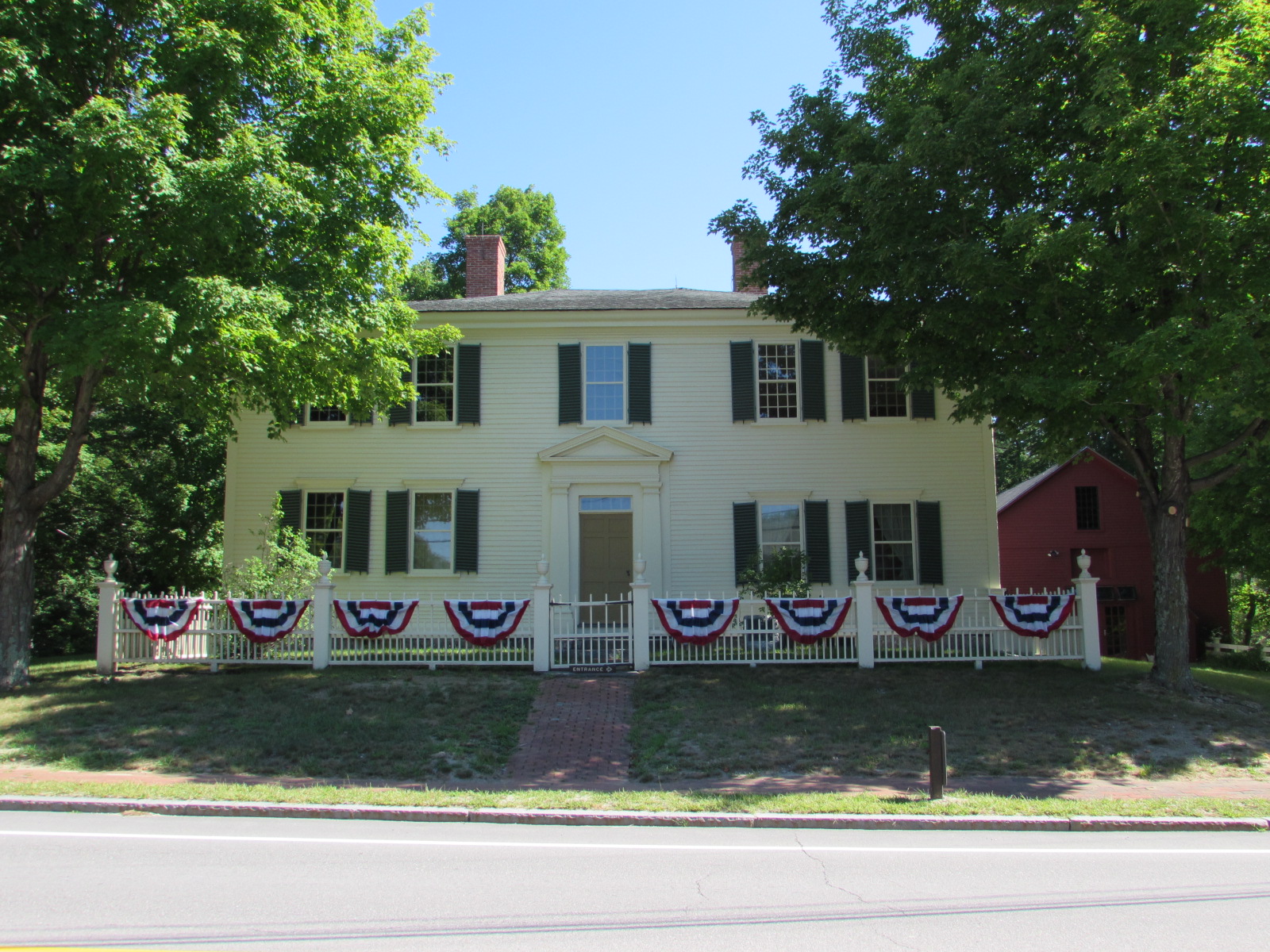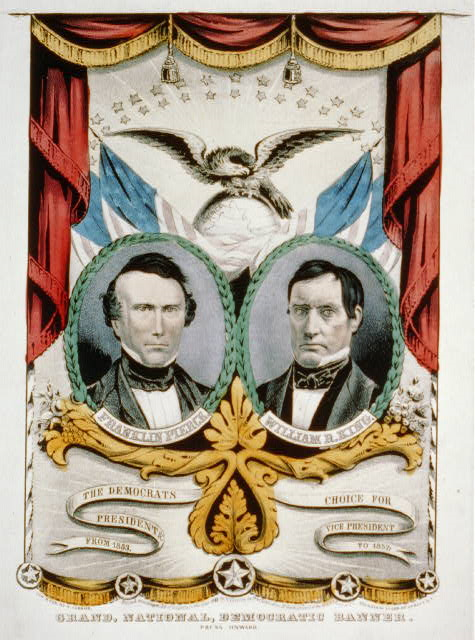|
List Of U.S. Presidential Campaign Slogans
This is a list of U.S. presidential campaign slogans from 1840 onward. 1800–1896 1840 *" Tippecanoe and Tyler Too" – 1840 U.S. presidential slogan of William Henry Harrison. Tippecanoe was a famous 1811 battle in which Harrison defeated Tecumseh; John Tyler was Harrison's running mate. *" Independent Treasury and Liberty" – Martin Van Buren 1844 *" 54-40 or fight" – James K. Polk, highlighting his position on resolving the Oregon Territory boundary dispute with Russia and the United Kingdom. *"Reannexation of Texas and Reoccupation of Oregon" – James K. Polk, drawing attention to his stand on Texas annexation and the Oregon boundary question. *"Who is James K. Polk?" – Henry Clay, suggesting that Polk was unknown, and so inexperienced and unqualified. *"Hurrah! Hurrah! The Country's Risin', for Henry Clay and Frelinghuysen!" – Henry Clay and running mate Theodore Frelinghuysen. 1848 *"For President of the People" – Zachary Taylor *"The Sub Treasury and ... [...More Info...] [...Related Items...] OR: [Wikipedia] [Google] [Baidu] |
Slogan
A slogan is a memorable motto or phrase used in a clan or a political, commercial, religious, or other context as a repetitive expression of an idea or purpose, with the goal of persuading members of the public or a more defined target group. The '' Oxford Dictionary of English'' defines a slogan as "a short and striking or memorable phrase used in advertising". A slogan usually has the attributes of being memorable, very concise and appealing to the audience. Etymology The word ''slogan'' is derived from ''slogorn'', which was an Anglicisation of the Scottish Gaelic and Irish ( 'army', 'host' and 'cry').Merriam-Webster (2003), p. 1174. Irish George E. Shankel's (1941, as cited in Denton 1980) research states that "English-speaking people began using the term by 1704". The term at that time meant "the distinctive note, phrase or cry of any person or body of persons". Slogans were common throughout the European continent during the Middle Ages; they were used primarily as ... [...More Info...] [...Related Items...] OR: [Wikipedia] [Google] [Baidu] |
Theodore Frelinghuysen
Theodore Frelinghuysen (March 28, 1787April 12, 1862) was an American politician who represented New Jersey in the United States Senate. He was the Whig vice presidential nominee in the election of 1844, running on a ticket with Henry Clay. Born in Somerset County, New Jersey, Frelinghuysen established a legal practice in Newark, New Jersey, after graduating from the College of New Jersey. He was the son of Senator Frederick Frelinghuysen and the adoptive father of Secretary of State Frederick Theodore Frelinghuysen. He served as the New Jersey Attorney General from 1817 to 1829 and as a United States Senator from 1829 to 1835. In the Senate, Frelinghuysen strongly opposed President Andrew Jackson's policy of Indian removal. After leaving the Senate, he served as the Mayor of Newark from 1837 to 1838. Frelinghuysen was selected as Clay's running mate at the 1844 Whig National Convention. In the 1844 election, the Whig ticket was narrowly defeated by the Democratic tic ... [...More Info...] [...Related Items...] OR: [Wikipedia] [Google] [Baidu] |
Abraham Lincoln
Abraham Lincoln (February 12, 1809 – April 15, 1865) was the 16th president of the United States, serving from 1861 until Assassination of Abraham Lincoln, his assassination in 1865. He led the United States through the American Civil War, defeating the Confederate States of America and playing a major role in the End of slavery in the United States, abolition of slavery. Lincoln was born into poverty in Kentucky and raised on the American frontier, frontier. He was self-educated and became a lawyer, Illinois state Illinois House of Representatives, legislator, and U.S. representative. Angered by the Kansas–Nebraska Act of 1854, which opened the territories to slavery, he became a leader of the new History of the Republican Party (United States), Republican Party. He reached a national audience in the Lincoln–Douglas debates, 1858 Senate campaign debates against Stephen A. Douglas. Lincoln won the 1860 United States presidential election, 1860 presidential election, wh ... [...More Info...] [...Related Items...] OR: [Wikipedia] [Google] [Baidu] |
1860 United States Presidential Election
Presidential elections were held in the United States on November 6, 1860. The Republican Party ticket of Abraham Lincoln and Hannibal Hamlin emerged victorious in a four-way race. With an electoral majority composed only of Northern states that had already abolished slavery, and minimal support in the Democratic-dominated Southern slave states, Lincoln's election as the first Republican president thus served as the main catalyst for Southern secession and consequently the American Civil War. The United States had become sectionally divided during the 1850s, primarily over extending slavery into the western territories. Furthermore, uncompromising pro-slavery elements clashed with those in favor of compromise; this created four main parties in the 1860 election, each with their own presidential candidate. The incumbent president, James Buchanan, like his predecessor, Franklin Pierce, was a Northern Democrat with Southern sympathies. Buchanan also adamantly promised not ... [...More Info...] [...Related Items...] OR: [Wikipedia] [Google] [Baidu] |
James Buchanan
James Buchanan Jr. ( ; April 23, 1791June 1, 1868) was the 15th president of the United States, serving from 1857 to 1861. He also served as the United States Secretary of State, secretary of state from 1845 to 1849 and represented Pennsylvania in both houses of the U.S. Congress. Buchanan was an advocate for states' rights, particularly regarding Slavery in the United States, slavery, and minimized the role of the Federal government of the United States, federal government preceding the American Civil War. Buchanan was a lawyer in Pennsylvania and won his first election to the state's Pennsylvania House of Representatives, House of Representatives as a Federalist Party, Federalist. He was elected to the U.S. House of Representatives in 1820 and retained that post for five terms, aligning with Andrew Jackson's Democratic Party (United States), Democratic Party. Buchanan served as Jackson's List of ambassadors of the United States to Russia, minister to Russia in 1832. He won t ... [...More Info...] [...Related Items...] OR: [Wikipedia] [Google] [Baidu] |
John Fremont
John is a common English name and surname: * John (given name) * John (surname) John may also refer to: New Testament Works * Gospel of John, a title often shortened to John * First Epistle of John, often shortened to 1 John * Second Epistle of John, often shortened to 2 John * Third Epistle of John, often shortened to 3 John People * John the Baptist (died ), regarded as a prophet and the forerunner of Jesus Christ * John the Apostle (died ), one of the twelve apostles of Jesus Christ * John the Evangelist, assigned author of the Fourth Gospel, once identified with the Apostle * John of Patmos, also known as John the Divine or John the Revelator, the author of the Book of Revelation, once identified with the Apostle * John the Presbyter, a figure either identified with or distinguished from the Apostle, the Evangelist and John of Patmos Other people with the given name Religious figures * John, father of Andrew the Apostle and Saint Peter * Pope John (dis ... [...More Info...] [...Related Items...] OR: [Wikipedia] [Google] [Baidu] |
1856 United States Presidential Election
Presidential elections were held in the United States on November 4, 1856. Democratic nominee James Buchanan defeated Republican nominee John C. Frémont and Know Nothing/ Whig nominee Millard Fillmore. The main issue was the expansion of slavery as facilitated by the Kansas–Nebraska Act of 1854. Buchanan defeated President Franklin Pierce at the 1856 Democratic National Convention for the nomination. Pierce had become widely unpopular in the North because of his support for the pro-slavery faction in the ongoing civil war in territorial Kansas, and Buchanan, a former Secretary of State, had avoided the divisive debates over the Kansas–Nebraska Act by being in Europe as the Ambassador to the United Kingdom. Slavery was the main issue, and with it the question of the survival of the United States as it then existed. The Democrats were seen as the pro-slavery party; the new Republican party, though hostile to slavery, limited its efforts to the politically more managea ... [...More Info...] [...Related Items...] OR: [Wikipedia] [Google] [Baidu] |
Henry Lee III
Henry Lee III (January 29, 1756 – March 25, 1818) was an early American Patriot (American Revolution), Patriot and politician who served as the ninth Governor of Virginia and as the Virginia United States House of Representatives, Representative to the United States Congress. Lee's service during the American Revolution as a cavalry officer in the Continental Army earned him the nickname by which he is best known, "Light-Horse Harry".In the military parlance of the time, the term "Light-horse" had a hyphen between the two words "light" and "horse". See the title page of ''The Discipline of the Light-Horse. By Captain Hinde, of the Royal Regiment of Foresters, (Light-Dragoons.)'' published in London in 1778, a cavalry tactics classic which was used as a manual. He was the father of Confederate general Robert E. Lee, who led the Army of Northern Virginia against the Union Army during the American Civil War. Early life and education Lee was born on Leesylvania (plantation), Lees ... [...More Info...] [...Related Items...] OR: [Wikipedia] [Google] [Baidu] |
Winfield Scott
Winfield Scott (June 13, 1786May 29, 1866) was an American military commander and political candidate. He served as Commanding General of the United States Army from 1841 to 1861, and was a veteran of the War of 1812, American Indian Wars, Mexican–American War, and the early stages of the American Civil War. Scott was the Whig Party's presidential nominee in the 1852 election but was defeated by Democrat Franklin Pierce. He was known as Old Fuss and Feathers for his insistence on proper military etiquette and the Grand Old Man of the Army for his many years of service. Scott was born near Petersburg, Virginia, in 1786. After training as a lawyer and brief militia service, he joined the army in 1808 as a captain of the light artillery. In the War of 1812, Scott served on the Canadian front, taking part in the Battle of Queenston Heights and the Battle of Fort George, and was promoted to brigadier general in early 1814. He served with distinction in the Battle of Chippawa bu ... [...More Info...] [...Related Items...] OR: [Wikipedia] [Google] [Baidu] |
Franklin Pierce
Franklin Pierce (November 23, 1804October 8, 1869) was the 14th president of the United States, serving from 1853 to 1857. A northern Democratic Party (United States), Democrat who believed that the Abolitionism in the United States, abolitionist movement was a fundamental threat to the nation's unity, he alienated anti-slavery groups by signing the Kansas–Nebraska Act and enforcing the Fugitive Slave Act. Conflict between North and South continued after Pierce's presidency, and, after Abraham Lincoln was 1860 United States presidential election, elected president in 1860, the Confederate States of America, Southern states seceded, resulting in the American Civil War. Pierce was born in New Hampshire, the son of state governor Benjamin Pierce (governor), Benjamin Pierce. He served in the United States House of Representatives, House of Representatives from 1833 until his election to the United States Senate, Senate, where he served from 1837 until his resignation in 1842. Hi ... [...More Info...] [...Related Items...] OR: [Wikipedia] [Google] [Baidu] |
1852 United States Presidential Election
United States presidential election, Presidential elections were held in the United States on November 2, 1852. History of the Democratic Party (United States), Democratic nominee Franklin Pierce defeated United States Whig Party, Whig nominee General Winfield Scott. Incumbent Whig President Millard Fillmore had succeeded to the presidency in 1850 upon the death of President Zachary Taylor. Fillmore endorsed the Compromise of 1850 and enforced the Fugitive Slave Act of 1850, Fugitive Slave Law. This earned Fillmore Southern voter support and Northern voter opposition. On the 53rd ballot of the sectionally divided 1852 Whig National Convention, Scott defeated Fillmore for the nomination. Democrats divided among four major candidates at the 1852 Democratic National Convention. On the 49th ballot, dark horse candidate Franklin Pierce won nomination by consensus compromise. The Free Soil Party, a third party (United States), third party opposed to the extension of slavery in the Uni ... [...More Info...] [...Related Items...] OR: [Wikipedia] [Google] [Baidu] |
Lewis Cass
Lewis Cass (October 9, 1782June 17, 1866) was a United States Army officer and politician. He represented Michigan in the United States Senate and served in the Cabinets of two U.S. Presidents, Andrew Jackson and James Buchanan. He was also the 1848 United States presidential election, 1848 Democratic Party (United States), Democratic presidential nominee. A slave owner himself, he was a leading spokesman for the doctrine of Popular sovereignty in the United States#Emergence of the term "popular sovereignty" and its pejorative connotation, popular sovereignty, which at the time held the idea that people in each U.S. state, U.S state should have the right to decide whether to permit Slavery in the United States, slavery as a matter of states' rights. Born in Exeter, New Hampshire, he attended Phillips Exeter Academy before establishing a legal practice in Zanesville, Ohio. After serving in the Ohio House of Representatives, he was appointed as a United States Marshals Service, U.S. ... [...More Info...] [...Related Items...] OR: [Wikipedia] [Google] [Baidu] |






